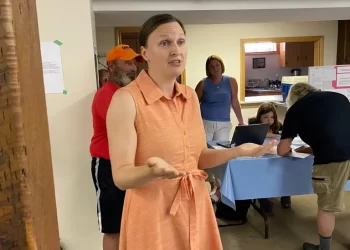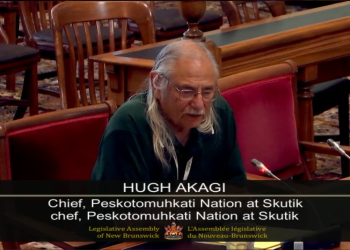Stopping the spraying of glyphosate on Crown (public) lands and waters stands out among the dozens of other pressing environmental issues in New Brunswick. The activist movement to stop spraying the poison has united a broad spectrum of groups and organizations, from hunting and fishing associations to Indigenous protectors of lands and waters.
A petition by the largest activist group on the issue, Stop Spraying New Brunswick (SSNB), has been signed by more than 34,000 citizens. New Brunswickers have organized dozens of public protests over the years demanding an end to glyphosate spraying, including on May Day this year in Saint John outside Irving buildings and most recently on Nov. 19 outside the New Brunswick Legislature, as part of a rally in support of the biologist Rod Cumberland.
As reported in numerous NB Media Co-op stories over the past decade, current forest management practices focus on creating and maintaining large-scale softwood tree plantations in a way that primarily benefits corporate owners and shareholders. The practices require the poison glyphosate to be sprayed to kill off other plant species to make the tree plantations more profitable. The poison harms ecosystems and animals and other species in forests and waterways.
These harmful forestry management practices have been supported by successive Progressive Conservative and Liberal governments. Governments have not only ignored the widespread public concerns about glyphosate spraying but also continued to approve licenses and the use of public funds by forestry corporations to spray the poison on Crown lands. SSNB reported on its website that a freedom of information request found that in 2017 alone, $2,860,000 in public funds were spent on glyphosate spraying in the province.
On Nov. 20, the day after the new Legislature opened this week, leader of the Green Party David Coon tabled a bill to end the practice on Crown lands. The Act to Amend the Crown Lands and Forests Act creates a new section of the Act that bans the aerial spraying of herbicides on Crown land and makes it an offense punishable with a fine of up to $200,000.
The bill also defines, for the first time, a herbicide: “a chemical agent or other product or substance registered under the Pest Control Products Act (Canada) that is manufactured, represented or used as a means of destroying, preventing, controlling or mitigating weeds or other plant life.” This clear definition will ensure that not only glyphosate but also all poisons will be included in the ban.
The Green Party bill has two purposes. In addition to the ban on glyphosate spraying, it ensures that New Brunswick mills purchase more wood from private woodlots and that they are fairly compensated.
In a media release about the proposed bill, David Coon noted that the provincial Auditor General recommended in 2015 that private woodlot owners should have fair access to the wood market but the government did not follow the recommendation. “This bill will remedy that by requiring private wood to be purchased through the wood marketing boards and ensuring that private wood makes up a third of the wood consumed by the mills,” says Coon.
Requiring mills to purchase wood from private woodlots will help sustain the economies of rural communities. Coon points out that woodlot owners, “like farmers and fishermen, are essential to the viability of rural economies, but they need to be able to make a reasonable living.”
The previous week, on Nov. 13, SSNB announced that David Coon, Megan Mitton and Kevin Arseneau, the three Green Party MLAs, had signed a pledge committing the politicians to ”take concrete action towards the banning of herbicide spraying on public lands in New Brunswick.” The pledge included raising awareness of the issue, drafting, tabling and debating the bill in the Legislature and working to gain support of the bill among MLAs. Gerald Bourque, leader of KISS party NB also signed the pledge in support of SSNB. No other MLAs or parties in the Legislature have signed the SSNB pledge.
The Green Party is now committed to moving its Act to Amend the Crown Lands and Forests Act through the slow legislative process. Legislation introduced by the opposition parties has only a small window of time to proceed: a few hours every Thursday afternoon when the Legislature is in session. The Official Opposition, the Liberal Party, can take most of the time slots on Thursday afternoons, leaving third parties like the Green Party with little time.
It will be only in January or later in 2020 before David Coon will have the opportunity to give his bill Second Reading, the most important stage in the passage of a bill. At this stage, Coon will present the rationale for his bill and debate its merits with other MLAs. If a majority of MLAs vote in support of the bill, it will pass to Committee for a more detailed review and debate. If it passes that stage and Third Reading, it will move to the final stage, Royal Assent. At that point, the bill becomes law.
David Coon’s bill specifies that it will come into force July 1, 2020, to ensure that it will be in place before the next round of spraying. However that will only happen if a majority of MLAs vote for the bill. In the current minority government situation, that means that the three Green Party MLAs, all the Liberal MLAs, and two of the three People’s Alliance MLAs must support it. If the Liberals support it but the People’s Alliance do not, the bill will not pass.
Susan O’Donnell is the research lead for the RAVEN project at the University of New Brunswick and a member of the NB Media Co-op editorial board.





![Delayed restrictions on herbicide prompt failing grade from environmental group [video]](https://nbmediacoop.org/wp-content/uploads/2025/09/StopSprayingSept92025-350x250.jpg)

![New Brunswick prof travelling to Egypt-Gaza border to call for end of blockade [video]](https://nbmediacoop.org/wp-content/uploads/2025/05/shutterstock_2576513645-120x86.jpg)
![People with disabilities are the heroes in new play by New Brunswick author [video]](https://nbmediacoop.org/wp-content/uploads/2025/09/PlaywrightSept222025-1-120x86.jpg)

